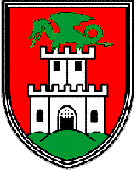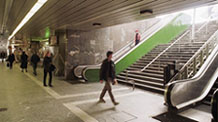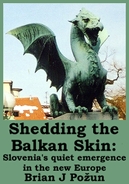In August of last year, an article in Travel & Leisure asked "Is Ljubljana the Next Prague?" Like Prague, Ljubljana teems with baroque, art nouveau and neo-classical architecture, and certainly the credit for the modern face of both Prague and Ljubljana goes to Slovene architect Jože Plečnik.
According to legend, the founder of Ljubljana was the Greek Prince Jason, who sailed from the Black Sea with his Argonauts and the Golden Fleece, up the Danube through the Sava and onto the Ljubljanica, the river which cuts through the modern city. Under the Romans, Ljubljana was the provincial town Emona, and under the Hapsburgs from the Middle Ages until 1918, it was the capital of the province of Carinthia and called Laibach. In 1991, Ljubljana became the capital of independent Slovenia, and in less than three years it could become the newest capital city of the European Union.
While part of Yugoslavia, Ljubljana was a center of alternative youth culture movements. Today, it maintains a vibrant alternative cultural scene, informally based in the old army barracks Metelkova. In August, it was decided to formalize the cultural use of the former squat and to transform part of the complex into an arts academy under the University of Ljubljana. Ljubljana is also home to the country's most prestigious university, and one Ljubljančan in ten is a student. Among its academic cultural institutions are four orchestras, 22 museums and over 100 libraries.
A public opinion poll taken this spring highlighted the issues Ljubljana and the Ljubljančani are facing. Respondents were harshly critical of the municipal administration, many answering that they believe administrators are more concerned with themselves or their salaries than with their official duties. However, the respondents appreciated the capital's cultural offerings and shopping choices. Crime was not mentioned as a significant problem; only 27 percent of the respondents said they generally do not feel safe in parts of the city after dark. Traffic, parking and crowds were named as major problems, however.
The current agenda
Home to only about 300,000 people, Ljubljana is comparable to mid-sized European cities. However, it is suffering the growing pains of a provincial center thrust into the role of a national capital. Just two weeks ago, the City Council passed a new ordinance which it hopes will be a step towards relieving the tremendous stress of daily traffic. Also on the City Council's agenda this month is an attractive plan to allow boats, both commercial and private, to use the Ljubljanica, the river that runs through the city. And at the beginning of the week, the City Council passed an ordinance restricting the sale of alcohol—stirring up tremendous controversy.
There are good reasons for why the poll revealed traffic and parking to be serious problems in the city. Every day, somewhere between 80,000 and 100,000 people—almost one-third of the city's total population—come into Ljubljana. Of those, 62,000 come to work and 10,000 to study. A total of 30,000 cars go through the town center alone each day, and 80 percent of them are parked for more than eight hours at a time.
Among the changes included in the new ordinance is a rise in the price of parking and higher fines (up to SIT 10,000, or USD 50), as well as the reintroduction of the penalty of arrest for parking violations. It will go into effect on 1 January, and throughout December the city is running a public information campaign on the changes. The head of the city's Department of Economic Services and Traffic, Pavel Klavs, told the press that "the goal of the decree is the protection of the city center and the eventual closing of it to traffic."
However, the weekly Mladina viewed the move much more cynically. It compared the price of one hour's parking in regional capitals and found that Ljubljana is one of the most expensive. One hour's parking in Trieste (Trst) is USD 0.50, in Zagreb, 0.75. Ljubljana, at USD 1.10 per hour, ranks just behind Vienna, at USD 1.65 per hour. The magazine accuses the Ljubljana City Council of being more interested in filling the city's coffers than actually fixing the traffic problem.
The plan to introduce boats to the Ljubljanica river is much less controversial. Led by the head of Ljubljana's Department of Urbanism, Igor Jurančič, the plan got a vote of support in a recent study by the Hydro-Economic Institute, which showed that the river could be made navigable with minimal difficulty. The draft ordinance went before the City Council this week, but no decision has been made as of yet.
Last week's ordinance regulating the sale of alcohol, however, is far more controversial than even the new traffic ordinance. The City Council passed the ordinance unanimously, banning the sale of alcoholic beverages at convenience stores and gas stations. No alcohol will be sold at all on Saturdays and Sundays, and alcohol may be sold only from 7am to 9pm on Mondays through Fridays. The ordinance is to be enforced beginning 1 January 2001.
People around the country are watching the issue develop in Ljubljana, wondering if it could happen in their town. The media immediately took to calling the ordinance "prohibition" and denounced the move as an infringement on citizens' rights. However, alcohol abuse and alcohol-related traffic accidents are major problems in Slovene society.
This week, Mladina threw its weight behind the ordinance's opponents. The article compares the new laws to prohibition in the United States in the 1920s, adding that American prohibition was the idea of rural, Protestant Anglo-Saxons, whose ideas are not relevant to Slovenes. This rabble-rousing statement comes not two paragraphs after the writer predicts the laws will cause an upswing in nationalism. The article denounces the City Council for trying to turn Ljubljana into one big "Alcoholics Anonymous" group and said that it implicitly discriminates against the poor.
The writer even goes so far as to cite Thomas Jefferson: "If the people allow the government to decide what they will eat and what sort of health they will enjoy, their bodies will soon fall into the same sorry state as the spirits of people living under tyranny."
A controversial mayor
The City Council is
not the only object of criticism in Ljubljana. Viktorija Potočnik, mayor since the 1998 local elections, is one of the few prominent women in Slovene politics. A member of the Liberal Democrats (LDS), which have led the country virtually non-stop since independence, she has made several comments about dissatisfaction with the government, but has not emerged as a vocal critic of the government's policies, unlike Maribor's mayor, Boris Sovič (United List of Social Democrats, ZLSD).
Late this spring, the Maribor-based daily Večer published a biting criticism of Ljubljana's mayor to celebrate the half-way mark of her term. Throughout the article, Potočnik is accused of building new housing units with no fair way to distribute them. She is also accused of commissioning large-scale studies on traffic and parking, but doing nothing substantial to solve the problems.
The article also echoes the most frequent criticism of Potočnik, which concerns her penchant for international travel on the city's tab. So far this year, she has visited Moscow, Vienna, Brussels and other European capitals as part of an initiative to foster cultural and economic cooperation between Ljubljana and other, more established capitals. Her constituency, however, often fails to see the value of these trips.
International cooperation
One of the first things Potočnik did upon assuming office was to meet with Trieste (Trst) mayor Riccardo Illy to discuss cooperation between the two cities. Until the First World War, Trieste had been the major Slovene center, even more so than Ljubljana. Yugoslavia struggled for decades to gain control of the city, but in 1954 conceded its loss to Italy.
The cultural and economic ties which began with Potočnik's and Illy's initial discussions have grown into a significant partnership and may even have influenced Illy's decision earlier this year to support the draft Law on the Global Protection of the Slovene Minority in Italy. From the end of the First World War until Illy stepped out in support of the local Slovene minority, Trieste had barely even admitted to having a Slovene minority, and had certainly never done a thing to support the group.
Upon her return from last week's visit to Vienna, Potočnik gave an interview to Večer in which she was forced to defend her frequent trips abroad. She justified them by pointing out their usefulness in three fields: economics, culture and inter-university cooperation and municipal affairs.
Representatives from local businesses and the municipal and national economies have accompanied every delegation she has led to European capitals. She pointed out two trips in particular as being significant for the economy: Vienna and London. The mayor of Vienna has become a "great friend of Ljubljana" and is influential within the EU. Contacts with him are useful on many levels. When the Ljubljana delegation visited London, it met not only with mayor Martin Clive, but with the most powerful bank in the world.
Representatives of cultural institutions and universities also form part of the delegations. The University of Ljubljana has signed numerous cooperation agreements with other major European universities. The delegations also meet with local Slovenes and Slovene organizations, such as the Society of Russian-Slovene Friendship in Moscow, the Society of Czech-Slovene Friendship in Prague and architect Boris Podrecca in Vienna.
The third field for which such trips are useful is municipal affairs. Aside from the lessons to be learned from more senior national capitals such as Vienna and Moscow, Ljubljana also has interests in sharing experiences concerning EU expansion with the capitals of other prospective member states, such as Prague and Budapest.
Ljubljana has also played host to official visitors from several other countries. So far this year, delegations have come from Athens, Brussels, Stockholm and Novi Sad.
The delegation from Novi Sad was the first official visit since the collapse of the former Yugoslavia almost ten years ago. Over the summer, Potočnik made the first visit of a Ljubljana mayor to Zagreb. A visit to Sarajevo, where she will meet with mayor Muhidid Hamamdžić, is planned for 1 to 2 December. She has also recently made several optimistic comments about establishing ties with Belgrade. She told Večer that perhaps success is possible on the municipal level, even where the national governments have failed.
Potočnik's vigorous program of inter-city cooperation will hit its apex next year at a meeting of mayors from Central European capitals, which she has planned. The meeting will take place in Ljubljana and mayors from all over the region will participate, except from Vienna, which will be in the middle of local elections at the time.
Rocky relations
Potočnik has lobbed some criticism of her own. She may not be as harsh or as forceful as Sovič in Maribor in denouncing the national government's treatment of her city, but she is no more satisfied. In an interview with the daily Dnevnik last week, she evaluated relations between the capital and the national government as "poor," adding that it is impossible to enumerate all of Ljubljana's issues with the government since there are just so many.
In particular, she pointed out the fact that parliament passed a law putting the financing of 80 km of new roads on the back of the city with no discussion with municipal leaders. In other cities, according to Potočnik, the state builds roads and sewage facilities. Contrary to Sovič's belief that Ljubljana is the darling of the government, Potočnik maintains that Ljubljana enjoys few perks from the government.
In another interview with Dnevnik, from 1998, Potočnik echoed Sovič's complaints that municipalities have not been involved in the EU accession process to any significant degree, even though municipalities are virtually as enmeshed in the process as the national government
Metropole Ljubljana
In recent years, Ljubljana has become much more visible on the world stage. In 1997, the European Union named it the Cultural Capital of Europe for the month of May. Visits by American President Bill Clinton and Pope John Paul II garnered tremendous amounts of publicity for the city. Earlier this year, the city was the host of the Ninth Meeting of Parliamentary Speakers from EU candidate countries, and throughout the summer it hosted the Manifesta 3 international art exhibition.
The city is certainly thinking bigger in its attempts to get the world's notice, and now such big thinking has come home to Ljubljana. A new advertising campaign by Seimens features a bustling, highly sophisticated metropolis. Residents were shocked when they looked closer and saw that it was actually their own city.
The same phenomenon is documented in the latest music video by the band Garbage Enemy. The video appears to be set in New York, but again the set was Ljubljana. The people going down the stairs to the metro are actually going into the underground passageway at Ajdovščina.
Ljubljana shares a Slavic, Central European, Hapsburg Empire cultural heritage with the Czech capital as well as the architecture and urban planning of Plečnik. However, it is significantly smaller than Prague, and does not share that city's history as an imperial and national capital. Ljubljana today is still struggling to fit into the role of Slovenia's capital city. Mayor Potočnik's controversial inter-city cooperation program could be of great help to the city, allowing it to learn valuable lessons from its more experienced neighbors. Perhaps Ljubljana may well be "the next Prague," but for the time being, Ljubljana is too busy trying to be Ljubljana to worry about being anything else.
Brian J Požun, 4 December 2000
Photo credits:
City crest—City of Ljubljana homepage
Ajdovščina passageway—Mladina
Elsewhere in CER:
Moving on:
Sources:
City of Ljubljana
Sound of Ljubljana
Mladina
Dnevnik
Večer
Travel & Leisure
Slovene planning and conservation policy
Pogoer.org








